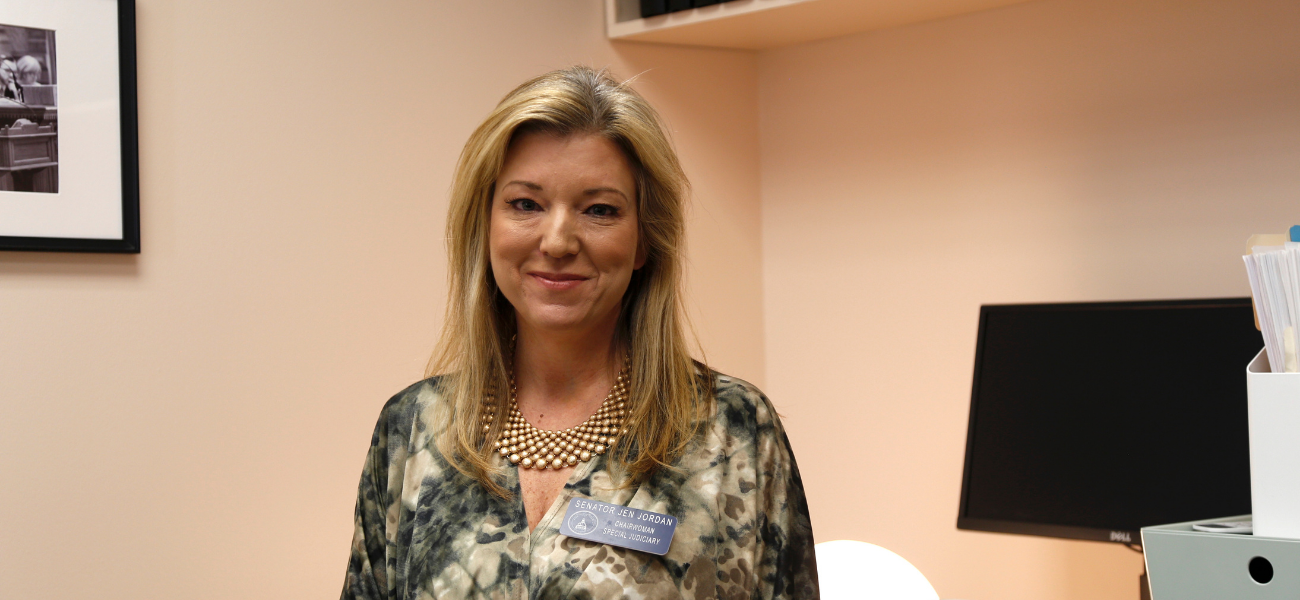Stay ahead of the curve as a political insider with deep policy analysis, daily briefings and policy-shaping tools.
Request a DemoMeet Jen Jordan: The State Senator running for Attorney General of Georgia

Photo Credit: Alessandro Marazzi Sassoon
- Playmaker: Jen Jordan
- Role: Georgia Senate member
- Tenure: December 2017 to present
Senator Jen Jordan grew up the eldest child of a single mother in Dodge County. A HOPE scholarship enabled her to go to Georgia Southern University and then law school at the University of Georgia. Since becoming a Senator for the 6th district, which represents parts of Cobb and Fulton Counties, Jordan has earned a reputation as a fighter and for applying her legal expertise to work with colleagues across the aisle. Now she’s running for Attorney General against Chris Carr.
State Affairs caught up with Jordan at her office in the Capitol to talk about her career and future aims. Her answers have been edited for length and clarity.
What was the professional path that led you to where you are now?
After graduating with honors from UGA’s School of Law she did a federal clerkship with Judge Anthony Alaimo, a former World War II prisoner of war.
“That’s what set me on my path of how I think about the law and what it should be: in service to the people,” she said. “And I think we forget about that sometimes.”
She went on to work for Atlanta law firm Bondurant, Mixson & Elmore, which specializes in civil litigation. Jordan found a mentor, she said, with the head of the firm, Emmett Bondurant.
“He’s a huge advocate in terms of people's constitutional rights, and standing up for those among us that aren't powerful,” she said.
Bondurant was one of the lawyers who argued the 1963 US Supreme Court case Wesberry v Sanders, one of a series of three cases that helped establish the principle of “one-person, one-vote.” That case struck down the County Unit system in Georgia which gave state legislative districts unequal populations.
“I really saw how he practiced law and what law should be and that lawyers really do have a higher duty in terms of their communities, because we can do stuff other people can’t, we can go into court, we can hold the powerful accountable, we can file lawsuits demanding answers,” she said. “We can compel agencies to turn over documents or to be more transparent.”
Jordan leveraged that experience to then work with Gov. Roy Barnes on consumer protection-related issues taking aim against the predatory payday loans industry.
“For many years we worked at trying to get the payday lending industry shut down in the state, and brought numerous class actions against them to try to run them out because they were charging like 1,000% interest on loans of $250 or $500,” she said. In many cases, she said, lenders would set up shop around military bases, knowing that many enlisted folks and their families came from poorer backgrounds.
“Looking back, it feels like I was representing people from my hometown that didn't have access to a lawyer,” she said. This ethos, she said, guided her in filing legal actions later on such as a challenge to voter ID laws that disenfranchised elderly people of color.
“A lot of these people have been born at home, didn't have birth certificates or didn't have access to them,” she said.
Before she was a Senator, Jordan also sued then-Secretary of State Brian Kemp’s office to give appropriate legal notice to Georgia voters whose personal data was compromised in 2015 when the state accidentally gave out social security numbers and other confidential information on nearly 6 million registered voters, an incident which some refer to as the Peach Breach.
“It's not about profit or money, it's about doing the right thing,” she said.

State Senator Jen Jordan in her office at the State Capitol this month. (Photo: Alessandro Marazzi Sassoon/ State Affairs).
Was there a defining moment for you that oriented your law career towards public service?
“So my mom was a single mom, but she had a beauty shop and – have you ever seen Steel Magnolias and the shop in that movie? With the ladies that are always there, and they're talking about everybody's business?” Jordan said, referring to the humble at-home beauty shop run by Truvy, Dolly Parton’s character in the 1989 classic film about the tight friendship between six southern women in small-town Louisiana.
“I basically grew up in that beauty shop going there every day and I would hear everything that was going on, people's problems: not being able to pay medical bills, children, abuse issues, husbands, and wives,” she said. “And one of the things I realized is, it doesn't matter who you are, or how much you go to church … bad things happen. And you just need someone fighting for you, and that's really kind of what has informed my law practice. And I think it also informs my public service.”
Jordan also points to a Georgia Supreme Court case she worked on in 2016 where an 18-year-old was sexually assaulted while under anesthesia and unsupervised at a dentist’s office. The court ruled the medical provider wasn’t liable for leaving the young woman unattended, which made the assault possible. Jordan disagreed with the court’s decision.
“If this is what the law is, this isn't what the law should be,” she said.
“It didn't feel like the voices of women and children and families were really being considered and so it was at that point where I made a decision that filing lawsuits, even pro bono to stand up for folks, really just wasn't enough anymore,” she said. Jordan said she felt an “obligation” to do more and so she ran for her senate seat.
What are your top accomplishments as a State Senator?
“One is actually trying to get the work done,” she said. Jordan recalled that when she first came into the legislature the state had found that property values and property taxes had been incorrectly appraised for years resulting in a sudden spike in taxes that year.
“I had to learn very quickly what was going on,” she said. “We're supposed to be problem solvers, and what I realized is that it's almost like treating your constituency like you do a client,” she said. “And so, that first year, I was able to get tax relief (for people).”
In 2018 there was a major case involving a Sterigenics facility and the emission of ethylene oxide into the environment that was linked to clusters of cancer patients in Georgia, including areas Jordan represents in Cobb County. Jordan advocated to have the plant shut down, at least temporarily, so an investigation of some kind could be pursued, but the state instead entered into a consent agreement with the company.
“I felt like they did that to circumvent the permitting process, which would have been an open process … So I filed a lawsuit basically saying they'd circumvented the permitting process,” she said.
This incident, she said, was crucial in her decision to run for attorney general, in part because a similar situation involving Sterigenics and ethylene oxide occurred in Illinois, and there the attorney general used his powers to temporarily shut down their facility. Jordan felt that Georgia Attorney General Carr should have done the same.
“Under Georgia law, he really was the only person who had the ability to act for the public good to go in and at least enjoin them temporarily, so we could kind of figure out kind of what's going on with the emissions,” she said.

State Senator Jen Jordan in her office at the State Capitol. (Photo: Alessandro Marazzi Sassoon/ State Affairs)
What was a time you faced criticism or were most challenged?
“I think one of the biggest issues really, that I've faced is that we don't have a lot of lawyers in the State Senate or in the General Assembly period,” she said. “And so it's very difficult sometimes to explain the legal implications of how laws really play out in the real world.”
“I wish more lawyers on both sides of the aisle would run,” she said. “Some of the better relationships I have from the Republican side are lawyers, we have a common language, but we’re used to fighting. That's what lawyers do. We fight. We get up and then we move forward. It's not a personal thing,” she said.
A lot of people learned your name after you gave a very personal speech in opposition to abortion legislation HB 481 in 2019, how did your life change after that?
“I think I got a lot of hate but I ignored it,” she said. “For me, it really was about trying to communicate to some of the Republicans — that I respect and I know— what the consequences were for women.”
The speech, in which Jordan shared the experience of enduring eight miscarriages throughout her life, was re-broadcast by national and local news networks. Recordings on YouTube have garnered tens of thousands of views.
“Maybe I was naive to think that it would change something, even one vote,” she said. “I think ultimately it probably changed some hearts.”
“Even though for me personally, it has probably caused more harm than good just because of people knowing so much about my life. But, I think in terms of the issues and the reason I think I was placed here, which is to advocate for women, I think it is exactly what I needed to do.”

A screen capture of State Senator Jen Jordan's dissent to HB 481 in 2019. (Georgia General Assembly Video Archives/State Affairs)
What are your top priorities for the session?
For the session, Jordan said she’s focusing on “nuts and bolts” issues. On the docket are finalizing the maps for the Fulton County commission and board of education. Also a priority, she said, is making sure district attorneys have the resources they need to work through case backlogs caused by COVID-19.
“There's a real issue around the state in terms of getting these cases prosecuted. And so that's kind of my focus right now. Making sure that that people's rights aren’t trampled, but at the same time making sure that the system is working,” she said.
Because she’s running for statewide office, Jordan expects she won’t be getting “a lot of love” from Republicans to pass any major legislative priorities. Still, she says, she hopes to use her voice to bring “common sense” and let constituents know what’s going on.
“There are really powerful people under the Gold Dome, but ultimately they work for you.”
Who else should State Affairs profile? Share your thoughts and feedback: [email protected]
Read this story for free.
Create AccountRead this story for free
By submitting your information, you agree to the Terms of Service and acknowledge our Privacy Policy.
Kemp signs bills on education, health care, taxes
Gov. Brian Kemp signed a slew of bills over the past week or so, including the private school voucher bill long sought by Republicans and a bill that will ease regulations over the construction and expansion of medical facilities in rural areas. His bill-signing events were clustered into themes: education, health care, military members, human …
Incumbent candidates for local, federal races likely to be no-shows at this weekend’s primary debates
ATLANTA — One of Georgia’s prominent media organizations is pleading with incumbent state and congressional candidates to participate in its primary election debates slated for Sunday.
For the first time in The Atlanta Press Club’s 30-year debate history, incumbents facing challengers in the May 21 primary have either declined or not yet committed to participating in the organization’s well-known debate series. The possible no-shows include candidates in four Congressional races as well as the Georgia Supreme Court, and the Fulton County District Attorney races.
“This is the first time that we’ve had so many [incumbents] not participate,” debate organizer Lauri Strauss told State Affairs. Strauss declined to speculate why candidates aren’t participating.
Hoping to encourage more participation, the organization issued the following statement:
“The Atlanta Press Club believes it is the responsibility of people running for public office to answer questions from their local media that will help inform voters before they cast their ballots. If a candidate is running for public office, the candidate should be willing to participate in the democratic process, which includes attending debates and fielding questions from journalists and opponents.”
Candidates have until Friday to RSVP.
Strauss said candidates who fail to appear will be represented on stage by an empty podium during the debate.
District Attorney Fani Willis has declined to participate and Democratic U.S. Reps. Lucy McBath and David Scott have yet to RSVP. Strauss said the organization is still in talks with Georgia Supreme Court Justice Andrew Pinson’s staff about his appearance in the debate.
Willis, declined earlier this week to participate, citing constraints around talking about sensitive cases like the criminal prosecution of former President Donald Trump.
McBath currently represents the 7th Congressional District and is now running in the newly drawn 6th Congressional District against two Democratic challengers, Jerica Richardson and Mandisha Thomas. McBath declined to participate in the press club’s general election debate in 2022, forcing her Republican challenger Mark Gonsalves to debate with an empty podium. McBath won with 61% of the vote.
The debates will air live on April 28 on GPB.org, on The Atlanta Press Club’s Facebook page (www.fb.com/TheAtlantaPressClub). It will be rebroadcast in early May on WABE.org.
| Race | Tape and Livestream Sun. April 28 |
GPB-TV Broadcast | WABE Broadcast |
| Congressional District 6 Democrats | 10:00 a.m. | April 29 at 7:00 p.m. | May 1 at 4:30 p.m. |
| Congressional District 13 Democrats | 11:15 a.m. | April 28 at 4:00 p.m. | May 1 at 5 p.m. |
| Congressional District 3 Republicans | 1:00 p.m. | April 28 at 5:00 p.m. | May 2 at 3:30 p.m. |
| Congressional District 2 Republicans | 3:00 p.m. | April 29 at 5:00 p.m. | |
| Georgia Supreme Court | 4:45 p.m. | May 2 at 4:30 p.m. | |
| DeKalb County CEO | 5:45 p.m. | May 2 at 5:15 p.m. | |
| Fulton County District Attorney | 6:45 p.m. | May 1 at 4 p.m. |
Have questions or comments? Contact Jill Jordan Sieder on X @journalistajill or at [email protected] and Tammy Joyner on X @lvjoyner or at [email protected].
And subscribe to State Affairs so you do not miss an update.
X @StateAffairsGA
Instagram@StateAffairsGA
Facebook @StateAffairsGA
LinkedIn @StateAffairs
‘It is nothing short of insane:’ Bill to criminalize squatting signed by governor
ATLANTA — Today Gov. Brian Kemp signed legislation criminalizing squatting, the illegal practice of entering and residing on someone else’s property without their consent. The Georgia Squatter Reform Act makes squatting a misdemeanor criminal offense, punishable by up to a year in jail, a $1,000 fine, or both. It also speeds up the timeline to …
State troopers are stretched to fight drugs and curb highway deaths
ATLANTA — When Cpl. Anthony Munoz straps on his bullet-proof vest each day and pulls out of the Department of Public Safety headquarters in Atlanta, Munoz never knows how his shift will unfold. What is for certain is that the traffic — of cars, criminals and contraband — is constant. And what is also true …




